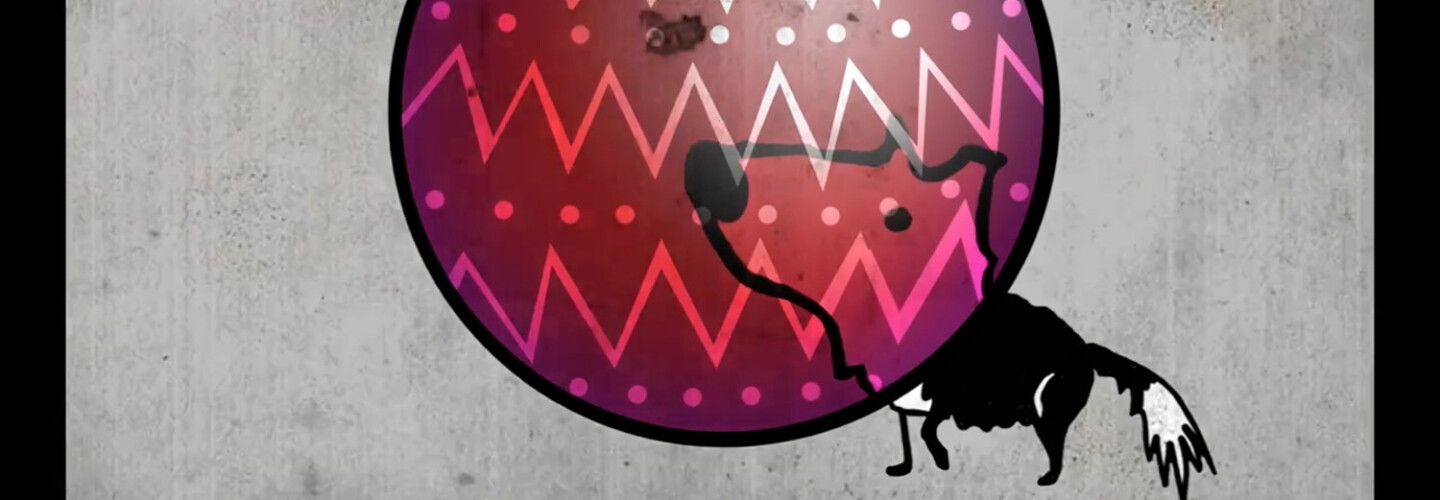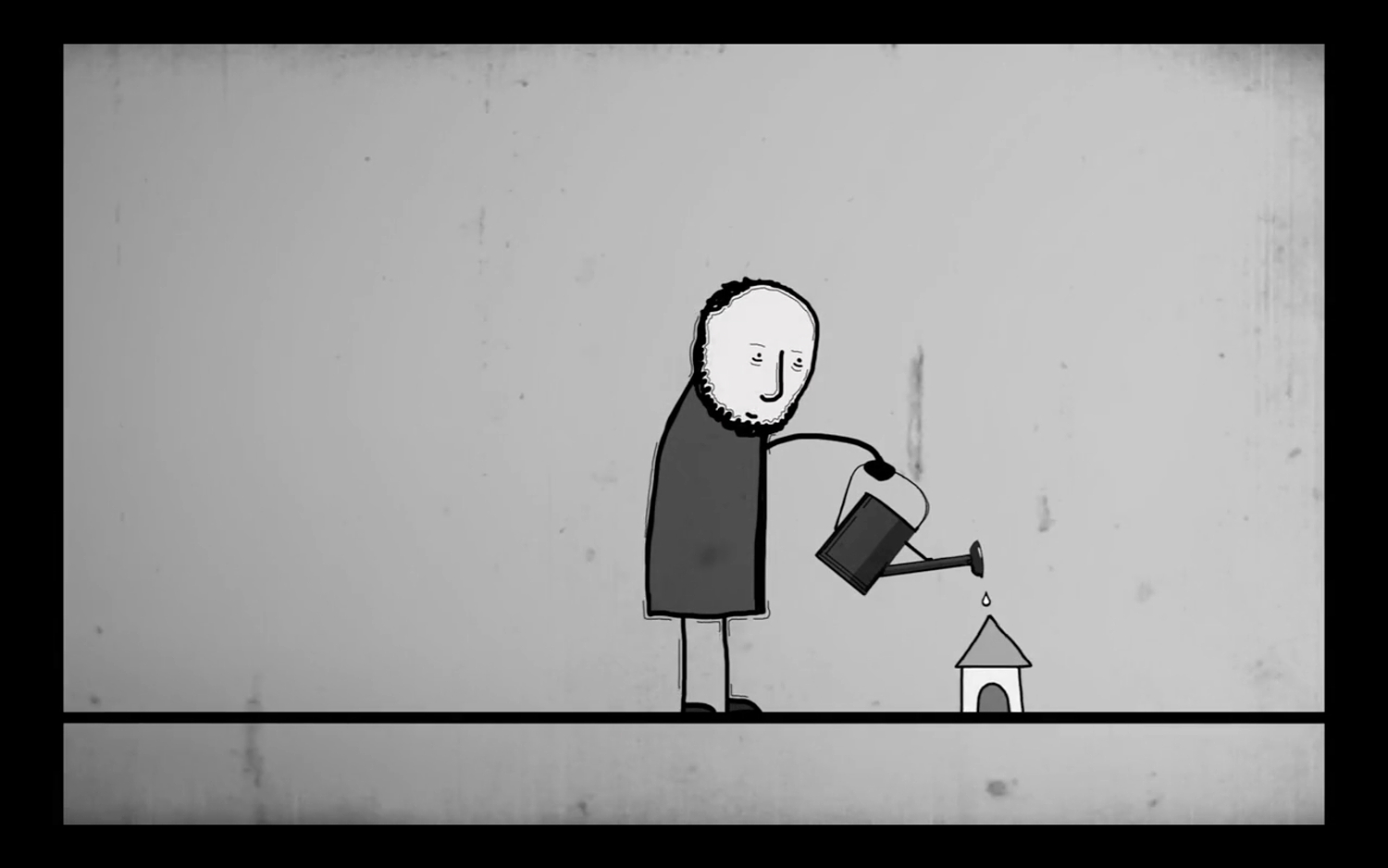
After having the pleasure of screening Luke Kondor’s tech support gone awry short Keith this summer, I was more than a little excited to hear that his new film Doghouse would be ready to take us into the holiday season. What I hadn’t prepared for was a story of such heart warming intensity that a feeling of happiness radiated to the very tips of my toes. And so, I invited Luke and Animator Emma Reading to talk to us about fear, locally sourced collaborators and how the pair captured the magic of confused recollection in their tale of dogs, Christmas and family.
A figure of speech which develops into a charming tale of familial love – where did the roots for Doghouse spring from?
Luke Kondor: I’m a huge fan of Magical Realist literature — Kafka, Murakami, Bender, and a few others, and I love the way in which the metaphors manifest themselves into the reality. I think it’s a beautiful way to display a story. Simon Rich is currently kicking ass in this genre – his sitcom is a prime example of how it can be done visually.
How did the two of you come to work together?
Emma Reading: At some point we have both been Derby dwellers, although I don’t think our paths ever crossed we share a lot of mutual friends. Carl Bryan who used to run Five Lamps Films at QUAD screened some of my work there when Luke was attending and from that he then got in touch with this narrative he was keen for me to work on. Luke might have a different story but that’s how I remember it all starting. (Luke: I concur.)
Doghouse unfolds within a haze of reminiscence. Did events playing out through memory inform the film’s tonal choices?
LK: I grew up in a house full of dogs. We had 10 at one point. Big ones. Sloppy kisses and furry school trousers and all that. I always tell my mum that I was raised by the dogs just as much as her just because I feel like I learned a lot from them. Not maths and pot-washing, but lessons about how to live a life and be happy in the moment. And so when I initially sat down to write the story, I was very much reminiscing about my own life. I liked the idea that my memories might have warped over time and the facts may have become distorted. I like the idea that the story is told from the perspective of a person, trying to recall a pivotal moment in their childhood, and getting a little confused along the way. When we talk about our past we often exaggerate the reality to emphasise the lessons we learned. I was trying to capture the magic that lies in that confusion.
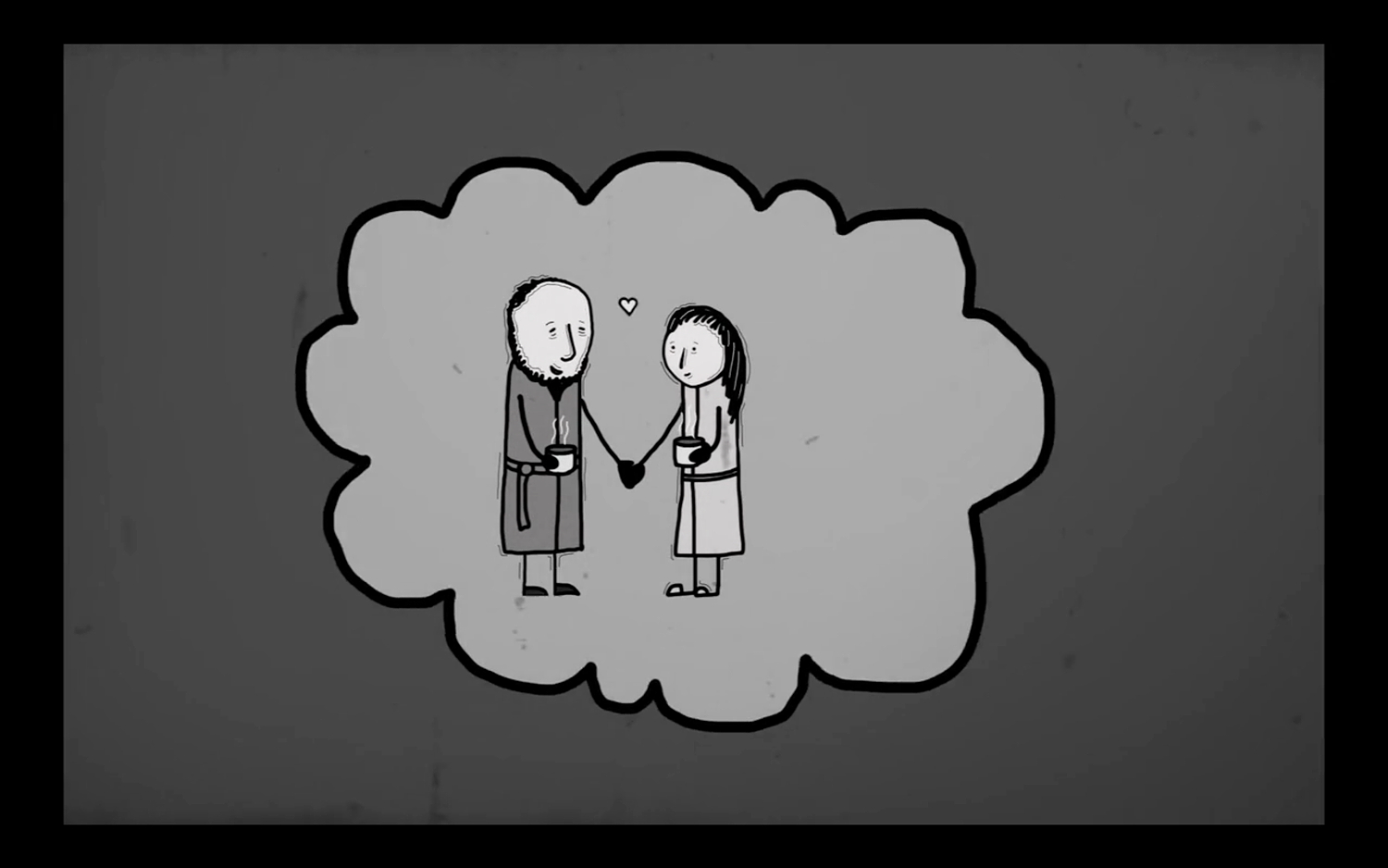
You initially pursued a funding route which unfortunately didn’t pan out. Were there particular issues potential funders had with the story? Didn’t the success of Keith hold any sway?
LK: Keith came later on actually. I made it as a response to not getting any funding. “Fine, you won’t give me money, I’ll make a film with nothing!” We tried various routes. I tried independent investors who had no interest in funding a weird short animated film. And I tried some of the funding schemes but I was either too old, too far away, too close, didn’t have the right smell, and in some cases, I didn’t have the right film. To be perfectly honest though, we didn’t really need funding. Sure, we could’ve pumped more into the production. Got some nicer foley work done. Maybe a better narrator. But I think more than anything I wanted somebody to tell me it was good enough. Putting work out there, especially of a personal nature, is scary. I wanted a big man with bottomless pockets to pat me on the back and say “This film is good enough. You are good enough”.
// As I write this I just got an email from London Calling saying a new short film pitch didn’t get shortlisted. So it goes…
Now I’m a little older I completely understand that when you apply for funding, you’re entering a lottery. A lot of people want that money and there’s no room to take punts on people like me. The only difference is that the cost for one of these tickets is a finished script, a logline, director’s statement, details of your life plan, and a fresh DNA sample. I don’t mean to be all down on funding, because I think it’s fantastic that there’s anything out there at all. But, one thing I would love for people to take away from my experience, is not to feel like you need funding. You don’t need that man with the money. All you need is the passion and courage to push through and get your film made. If it doesn’t work, move onto the next one.
You don’t need that man with the money. All you need is the passion and courage to push through and get your film made.
Emma, what elements of your previous animation style did you bring to this project?
ER: I enjoy doing a spot of rotoscoping. That’s usually quite apparent in a few of my videos. Apart from that there were quite a few things I did differently with this project compared with previous ones. For instance I had never animated dogs before so during the character design I was trying to create these dogs which firstly needed to look like dogs, secondly I could animate realistically (for a cartoon dog anyway) and thirdly wouldn’t take years to achieve. That and creating these constant moving lines even when a character can be still was a new style that I was drawn to and keen to try for this particular piece.
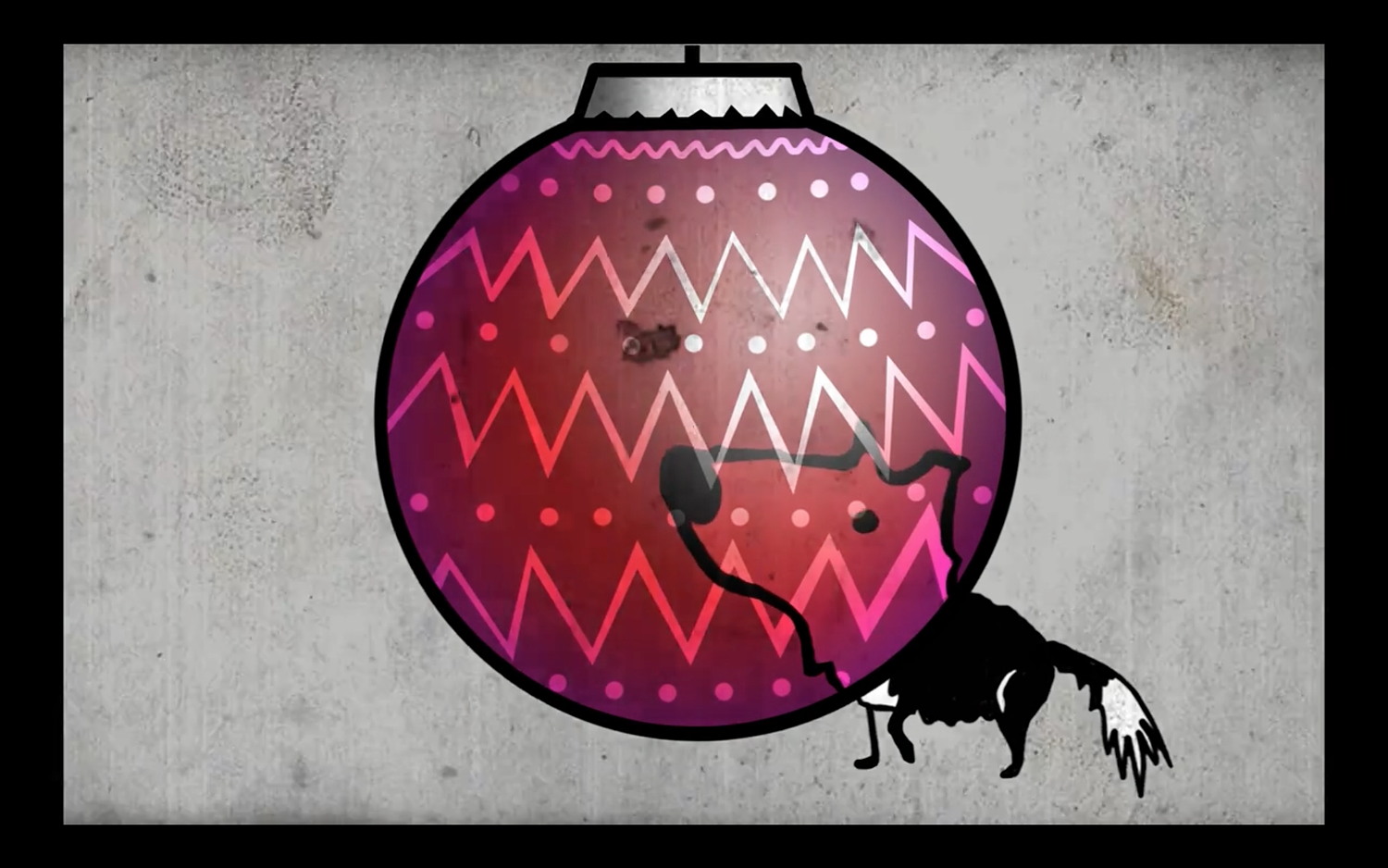
There’s a great sparse quality to the animation style which is complimented by these flourishes of morphing lines, words and characters. How did the look of Doghouse develop from your early conversations?
ER: When we had our initial meeting we were both quite keen to create this slightly unusual world which blends the story with imagination. With the story coming from the young boy’s perspective there was a sweet, soft and subtle tone in Luke’s voice that I wanted to try to reflect through the visuals. The characters needed to look innocent and delicate. The boy I particularly wanted to come across as an observer who is doing his best to carry on with a normal routine and is trying to make sense of it all. I wanted to exaggerate some of the feelings that a young person would feel where an adult could often be numb – for instance when his father tells him he was too young to understand, or when he says “You’re getting a divorce?” and everything shatters. I tried to blend these exaggerations into elements of the imagination to help make more of an impact on the boy’s view of the story.
For me as well, some words really stood out which I think can get a bit lost when there is a narration going on with visuals and a sound track. I thought by blending these words/sentences into the scenes it may focus the viewer on some of these clips as if they were experiencing them themselves first hand. Overall it was a really lovely and thoroughly enjoyable story to work to. Once I was happy with the style I really enjoyed creating this world with camera pans, travelling lines and play on words. It all just seemed to flow.
The initial plan was for Craig Roberts to provide narration, yet the relatable, matter of fact tone you bring here (as in Keith) feels perfect. How did you envisage Roberts’ performance?
LK: I loved Craig Roberts’ voiceover in Submarine. He has such a great timbre. Like a wayward soul trapped in the body of a schoolboy. That’s what I had in mind for the Doghouse narration. Again, this is what I wanted to find funding for, but in many ways I’m happy how it turned out. Even if it is starting to paint me as that guy who talks over his films.
Haiku Salut’s Six Impossible Things is the perfect musical guide through the story. How did you discover the track?
LK: I found that track really early on. I found it the same way I found Emma actually, all locally sourced, fresh produce. I went to my film night and saw one of Emma’s animations, and one of Haiku Salut’s music videos. That was on the same night! I had the story in mind already and I knew that the three elements would fit together nicely. There’s a huge amount of talent out there in the UK. I’d advise everyone to grab a clear plastic bag and pop to a local night. See what’s ripe. See what’s ready for picking. Make a salad.
You’ve spoken about fear being a frequent obstructor on this project. In which ways did it manifest and how did you push past that reoccurring obstacle?
LK: Earlier this year I started doing tiny projects with specific deadlines. I’d give myself 7 days to write and publish a short story. 7 days to make and upload a short film. I quickly realised that a lot of the fear was in my head. The deadlines helped me push past all that. After having a little success with those projects I gave myself a deadline for Christmas this year, and regardless of the fear, I knew we’d get it done.
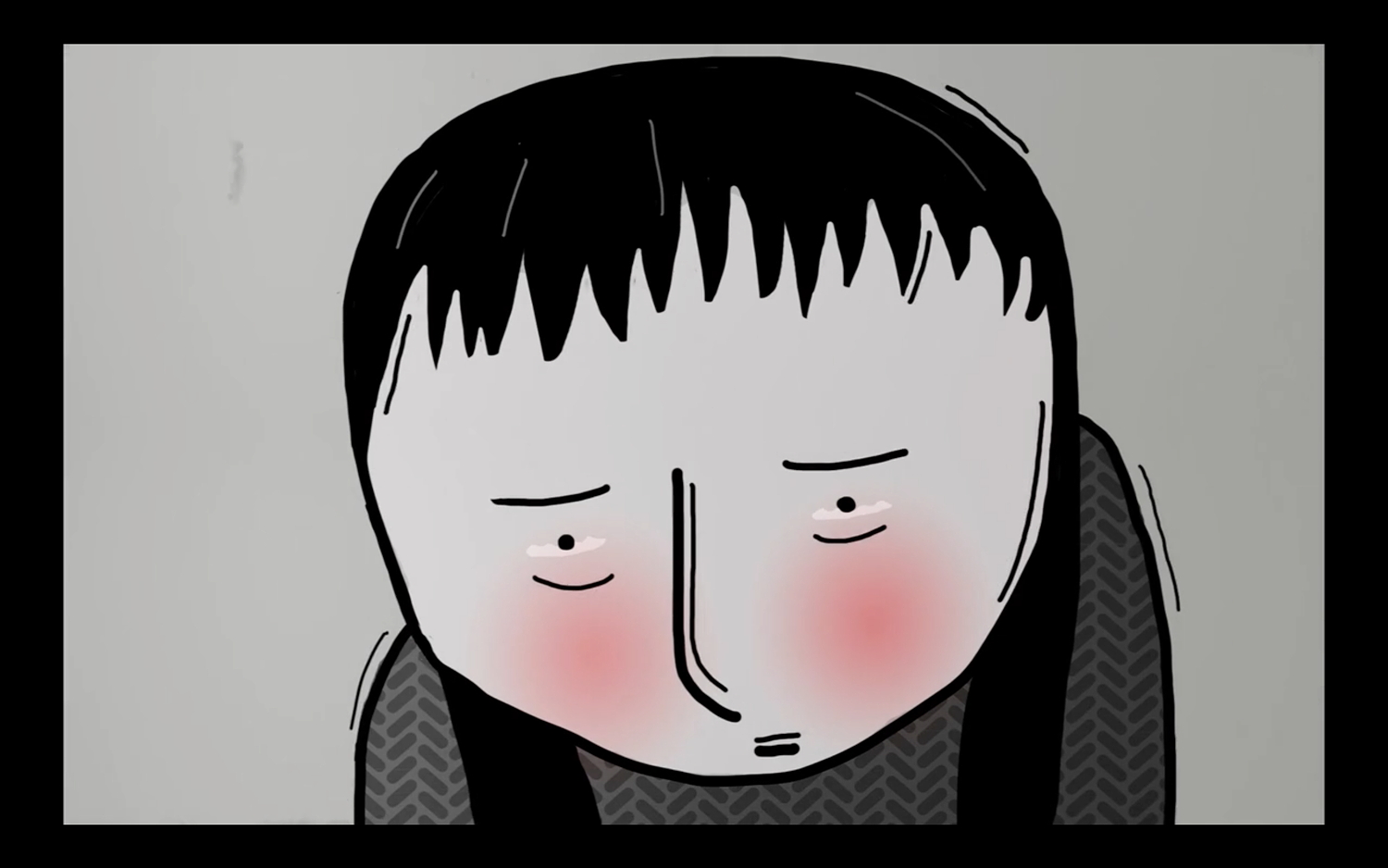
And how did you go about getting the animation done?
ER: I use Photoshop to animate with and Premiere for editing. I usually pick out a few scenes to start with that really stand out to me in the way that I can visualize how I would like them to turn out. This usually helps me to grasp a style that I feel could work with the whole film. I then get on with character design. With the characters I wanted to create this continuous movement within the lines. To achieve this I would keyframe a character, duplicate it two to three times, adjust each duplication slightly in looks and then keyframe the opacity of each layer to create the subtle line movement. Other scenes were created by filming myself, for instance the arm in the opening scene, and then rotoscoping the bits that I wanted. Other scenes were done by eye and then just plonked into Photoshop for tidying up. Ta da!
Doghouse arrives online without hitting the festival circuit first. What are your thoughts on the best release strategy for short filmmakers?
LK: Yes. lol. Well, after hanging around for two years I knew that festivals were going to be another case of the gatekeepers. I really didn’t want to wait around again. I totally understand the need for them, and the value they bring, but at the same time, I hate the idea of not putting it online first. As filmmakers and storytellers it’s paramount for us to build our own audience, so that we can call on them for help, and to potentially fund our future projects. This is insanely difficult if your film isn’t online. And in that regard, I feel like those film festivals are stifling the filmmakers out there, and in a way, themselves.
I knew that festivals were going to be another case of the gatekeepers.
I got some great advice from Katie at Festival Formula and a couple of filmmakers about where to send the film, and I will be sending it to those that allow for films that are online, but I’m not going to worry about it too much. Having said that, I would always send my films to what I consider to be the online equivalents — Directors Notes, Short Of The Week, etc. Regardless of whether they accept the film or not, there’s a real sense that they’re pushing the medium and celebrating the filmmakers.
What will we see from you next, and will you be reprising your role as narrator?
LK: Well, I don’t want to be known as the guy who makes films and talks over them, but I would love to turn Keith or Doghouse into a web-series of sorts. Create strong recurring characters and tell the stories over longer periods of time. My first novel is coming out on January 1st too. It’s called The Hipster From Outer Space and it’s about an ancient space-being who wakes up in the body of a hipster in East London. So, standard stuff really. More to be found at Hawk & Cleaver.

